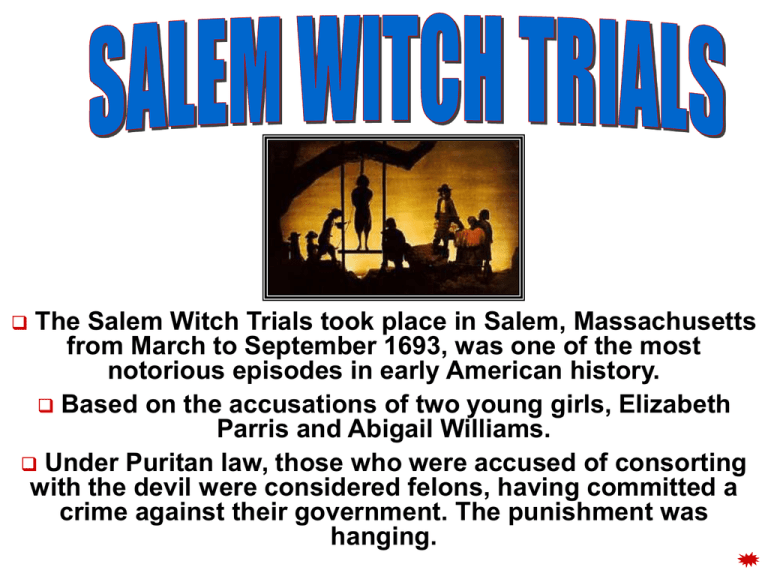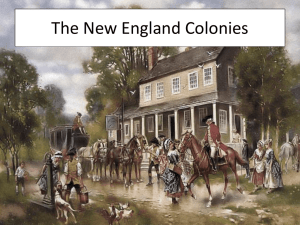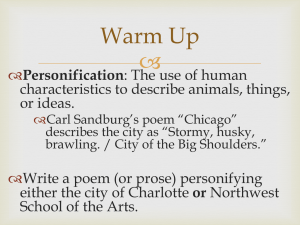Title: Major Events of the Period - St. John`s School AP US History
advertisement

The Salem Witch Trials took place in Salem, Massachusetts from March to September 1693, was one of the most notorious episodes in early American history. Based on the accusations of two young girls, Elizabeth Parris and Abigail Williams. Under Puritan law, those who were accused of consorting with the devil were considered felons, having committed a crime against their government. The punishment was hanging. These were not the first witch trials in America. • But it returned in 1692 & mass hysteria gripped New England. • Historians have attributed it to the tension that existed within the colonies (loss of Puritan values) & outside pressures (with Native Americans & Britain) From 1692 to 1693, more than 130 “witches” were jailed or executed in Salem. • A group of teenage girls accused people in their colony of consorting with the Devil. Causes? • There are a variety of factors that may have contributed to it. • Here are a few causes that are offered by historians: Cause 1: Puritans feared that their religion – which they believed was the only religion – was on its way out • Many second- and thirdgeneration Puritans lacked the fervor of the original Pilgrim and Congregationalist settlers. • Normally, a Puritan had to experience the gist of God’s grace in order to be baptized by the church. • These “visible saints” could vote and & hold public office With so many, particularly men, losing interest in the church, the Puritan clergy decided to baptize all children whose parents were baptized. • However, since they did not experience God’s grace were not allowed to vote • This was referred to as the Halfway Covenant. • Called “Halfway” because they were baptized but could not vote Cause 2: Attacks by Native Americans • Some of the accusers in the Salem Witch Trials: – Were domestic servants who were orphaned in Indian attacks in Maine or – Had lost grandparents from King Philip’s War and King William’s War • New Englanders feared a repetition of the devastation of King Philip’s War. – For 8 months, witchcraft accusations took place in the areas most threatened by the Indian attacks in southern Maine and New Hampshire. • These young women (the most powerless people in a region apparently powerless to affect its fate) offered their fellow New Englanders a compelling explanation for the town’s troubles • The girls also accused prominent men from the Maine frontier who had traded with or failed to defeat the Indians Cause 3: New England endured the autocratic control of the Dominion of New England. • Puritan New England was believed to be a hotbed of smuggling. • When James II became king in 1685, he sought to bring order to what he saw as a chaotic state in the American colonies. • Administrators began to chip away at the privileges granted in colonial charters and to reclaim proprietorships for the Crown. •Forced by King James II •NE Colonies, NJ & NY Goals •Restrict Colonial trade •Defend Colonies •Stop Colonial smuggling Sir Edmund Andros •Gain control over Colonies •Eliminated town meetings, the press and schools •Taxed without the consent of the governed The charters of all the colonies from New Jersey to Maine were revoked. • Sir Edmund Andros became the governor. • He had no term limits; dissolved the assemblies; only needed consent of an appointed council to make laws and levy taxes The Dominion of New England came to an end when the Glorious Revolution in England overthrew King James II in 1688. • He was replaced with Mary (his daughter) & William (her Dutch husband from the county of Orange). • In 1691, Mass. became a royal colony under the new monarchs • Suffrage was soon extended to all Protestants (previously only Puritans could vote) • This weakened Puritan primacy, making them uneasy. The hysteria ended when teenage girls accused some of the colony’s most prominent citizens, thus turning town leaders against them. • However, by then, 14 women & 5 men were hung – 1 man pressed to death by stones – 54 confessed to being witches – More than 140 people were jailed for many months What did it reveal? The strictness of Puritan society The insecurity of the Puritan leaders in keeping control of their colony The superstitious mindset of Puritan New England The colony’s magistrates were willing to believe the girls’ accusations, because if the Devil had caused New England’s current troubles, they bore no responsibility for the terrible losses on the frontier.











